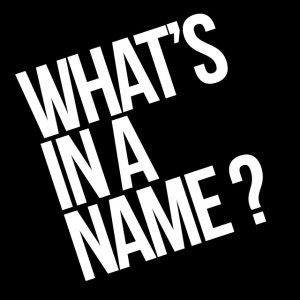Ideally what you’re after is to ensure the business name conveys your expertise, value and uniqueness.
When you are choosing a name for your business you want something that sums up the values of the business and any distinguishing characteristic that the business has. Are you looking to stand out or do you want to fit in? Usually it’s all about standing out from the crowd so that people will notice you (Down the Drain Plumbers) but sometimes if you want instant credibility you may just opt for something simple (DtD Plumbers). You may just use your name – after all that worked for Marks and Spencers, FW Woolworths and Ryman.
If your business is serious, you’ll want a serious sounding name (No. 17 for a chic hairdressing salon) but if you’re light hearted you’ll opt for something that reflects this (Curl Up and Dye hairdressers). Or if you’re in a very competitive market you definitely want people to remember you so you’ll tend to go for something that grabs the attention (By the Balls? For a sports shop anyone?) Alternatively if you don’t want to offend people you could just call yourself Next or Matalan or something.Gap was founded in 1969, and was so named because its targeted customers were the younger generations (at the time they were known as the generation gap). Dorothy Perkins was actually a family firm named H. P. Newman that was founded in 1909, but that was seen to have limited appeal and so it was renamed in 1919.
It’s true that big companies tend to go with safe and flat names, but you as an entrepreneur can really go for something different if you like, so here’s some tips.
Pick a name with words that you can play with ⎯ My Plaice for a fish and chip shop, Cutting Edge for a hairdressers, Chic Chicks for a dress shop. You get the idea. On my Facebook yesterday there was a photo of a Robin Reliant delivery van with the legend ‘Only foods and sauces’ on it. Clever!Be original Don’t copy anyone else
Keep it simple You need a name that people can spell and pronounce. If they can’t spell it they won’t share it on social media, and if they can’t pronounce it they won’t talk about it, so you’ll lose out big time.
Consider the domain you want to use online Assuming that you will have an online presence you want a name that you can easily incorporate as an URL. Increasingly it’s becoming difficult to find single words that haven’t already been used on the Internet. You also want to steer clear of something that is spelled differently to the way people expect to say something. It is worth playing around with phrases, so for example, The Candle Shoppe has the URL http://somethingforthewickend.co.ukUse foreign words If your first choice in English is already taken, maybe try another language. Clothes in Spanish is ‘ropa’ and in Italian is ‘vesititi’.
Make something up If you’re really clever and creative you might be able to come up with a pretend word that instantly says what you do. Take Compaq for example. This was developed by a naming firm for a range of portable computers, and it really works.
To dot com or not to dot com The jury is out on this one. A dot com domain name may be seen to lend credibility to your business but on the other hand with new domains opening up, is there really a difference? If someone wants to find you, they will.
Should you call your business after yourself? Well you can do of course. Many family businesses go on for generations. However, if you think you might want to sell the business one day, there may be more leverage in you giving it a different name. This isn’t always the case by any means but it is something to consider.Don’t limit yourself As a SME you’ll be starting out small but with any luck you’ll expand in the years to come which will mean that you might want to diversity. Don’t call yourself The Dog Collar Company if you think you may end up selling cat beds and hamster cages in the future. Similarly, there’s no point in calling yourself Torbay Telephones if you intend to sell phones in Kent as well.
Should you have a Trademark? If you are a UK based business you don’t need to file a trademark. You simply use your trademark in connection with your goods or services and you will automatically have the rights to it.
Mistake Inc. Don’t use the word “Inc.” after your name unless your company is actually incorporated.
Test your name out Try and come up with four or five names that you really like and then do a search online to see if there’s anything out there that is similar. You really don’t want to end up treading on anyone’s toes. Ask people what they think of the name and listen to their responses. Act on suggestions.
Once you have a name it’s time to get enthusiastic and sort out the branding. It’s time to build a strong company identity. Go for it!
How did you come up with your business name? Let us know below or come and visit us on our Facebook page here. 
 Wholesale
Wholesale 




2 Responses to “What’s in a name? Tips for naming your new business”
I will always remember the hairdressers in Westbourne, Bournemouth that had to change its name…. from Blo-Jobs!!
LOL Andy! That’s a good one.